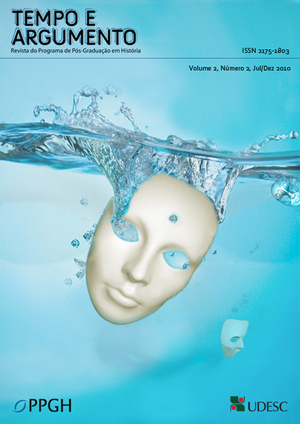Refletindo sobre a construção de identidades diaspóricas: estudo de caso sobre a “hinduidade”
DOI:
https://doi.org/10.5965/2175180302022010200Palavras-chave:
diásporas, identidades culturais, mobilidade migratória, Índia, nacionalismo hindu contemporâneoResumo
Em se tratando da construção de identidades culturais no contexto de intensificação e diversificação de fluxos migratórios característico dos processos de globalização contemporâneos, deve-se destacar a complexidade associada à coexistência de tendências à homogeneidade e à heterogeneidade, bem como à possibilidade de que tais identidades sejam construídas a partir da sociedade de origem ou da sociedade de destino. Por meio da apresentação de um estudo de caso sobre a identidade diaspórica hindu (Hindutva, “hinduidade”), pretende-se analisar a construção de representações sobre a migração de indianos por organizações nacionalistas hindus contemporâneas, concedendo-se especial atenção a dois aspectos de tal construção: (1) a relação entre as dimensões nacional e transnacional em uma concepção de identidade diaspórica elaborada a partir da sociedade de origem; (2) a definição de uma identidade diaspórica em termos religiosos.
Downloads
Referências
BEINE, Michel; Docquier, Frédéric; Özden, Çaglar. Diásporas. Policy Research Working Paper 4984. The World Bank Development Research Group. Trade and Integration Team, July 2009. Disponível em: <http://econ.worldbank.org> Acesso em: 30 jul. 2009.
BHATT, Chetan. Dharmo rakshati rakshitah: Hindutva movements in the UK. Ethnic & Racial Studies, London, v. 23, n. 3, May 2000. p. 559-593.
BHATT, Chetan; MUKTA, Parita. Hindutva in the West: Mapping the Antinomies of Diaspora Nationalism. Ethnic & Racial Studies, London, v. 23, n. 3, May 2000. p. 407- 441.
BRASS, Paul. The politics of India since independence. Cambridge: Cambridge University Press, 2001. 2nd edition.
CALHOUN, Craig. Nationalism and difference: the politics of identity writ large. In: CALHOUN, Craig. Critical Social Theory: Culture, History and the Challenge of Difference.Oxford UK & Cambridge USA: Blackwell, 1995.
CALHOUN, Craig. Multiculturalismo e nacionalismo, ou por que sentir-se em casa não substitui o espaço público. In: MENDES, Candido (org.) Pluralismo cultural, identidade e globalização. Rio de Janeiro: Record, 2001.
CASTELLS, Manuel. Paraísos comunais: identidade e significado na sociedade em rede. In: _______. O poder da identidade. São Paulo: Paz e Terra, 1999.
COHEN, Robin. Global diasporas. An introduction. London: UCL Press, 1997.
DIXIT, Prabha. The ideology of Hindu nationalism. In: PANTHAM, Thomas; DEUTSCH, Kenneth L. (Eds.) Political thought in modern India. New Delhi: Sage Publications, 1986.
ELIAS, Norbert; SCOTSON, J. L. Os estabelecidos e os outsiders: sociologia das relações de poder a partir de uma pequena comunidade. Rio de Janeiro: Jorge Zahar Ed., 2000.
FEATHERSTONE, M. O desmanche da cultura. São Paulo: Studio Nobel, 1996.
GEERTZ, Clifford. O mundo em pedaços: cultura e política no fim do século. In: GEERTZ, Clifford. Nova luz sobre a antropologia. Rio de Janeiro: Jorge Zahar Editor, 2000.
GIDDENS, Anthony. Globalização. In: ________. Mundo em descontrole. São Paulo: Record, 2000.
GILROY, Paul. Diaspora and the detours of identity. In: WOODWARD, Kathryn (Ed.). Identity and difference. Sage Publications: London, Thousand Oaks, New Delhi, 1997.
GOLWALKAR, M.S. Bunch of thoughts. Bangalore: Sahitya Sindhu Prakashan, 1996.
HALL, Stuart. A identidade cultural na pós-modernidade. Rio de Janeiro: DP&A, 2003a.
HALL, Stuart. Da diáspora. Identidades e mediações culturais. Organização Liv Sovik. Belo Horizonte: Editora UFMG; Brasília: Representação da UNESCO no Brasil, 2003b.
HIGH LEVEL COMITEE ON THE INDIAN DIASPORA. Report of the High Level Comitee on the Indian Diaspora. New Delhi, Jan. 2002. Disponível em: <http://indiandiaspora.nic.in/> Acesso em: 30 out. 2006.
HOBSBAWM, Eric. Nações e nacionalismo desde 1780: programa, mito e realidade. Rio de Janeiro: Paz e Terra, 1990.
KAVIRAJ, Sudipta (Ed.). Politics in India. New Delhi: Oxford University Press, 1997.
LAL, Vinay. Reflections on the Indian diaspora. 1997a. Disponível em: <http://www.sscnet.ucla.edu/southasia/Diaspora/diaspora.html> Acesso em: 10 abr. 2004.
LAL, Vinay. The Indian diaspora. 1997b. Disponível em: <http://www.sscnet.ucla.edu/southasia/Diaspora/diaspora.html> Acesso em: 10 abr. 2004.
LAL, Vinay. Labour and longing. Seminar,n. 538, June 2004. Disponível em: Acesso em: 7 nov. 2006.
MADHOK, B.; RAO, K. S. N.; SESHADRI, H. V.; SUDARSHAN, K. S. Why Hindu Rashtra?Delhi: Suruchi Prakashan, 1990. Disponível em: http://www.hindubooks.org/whr/index.htm. Acesso em: 28 jul. 2003.
MÉDAM, Alain. Diaspora/Diasporas. Archétype et typologie. Revue Européenne de Migrations Internationales, v. 9, n.1, 1993. p. 59-66. Disponível em: <http://www.persee.fr> Acesso em: 29 jun. 2009.
MUKTA, Parita. The public face of Hindu nationalism. Ethnic & Racial Studies, London, v. 23, n. 3, May 2000a. p. 442-466.
MUKTA, Parita. Romila Thapar: On historical scholarship and the uses of the past (interview with Parita Mukta). Ethnic & Racial Studies, London, v. 23, n. 3, May 2000b. p. 594-616.
OFFICE OF THE REGISTRAR GENERAL & CENSUS COMISSIONER. Census of India. New Delhi, 2001. Disponível em: Acesso em: 25 mar. 2007.
OLIVEIRA, Mirian S. R. de. O “mundo hindu”: identidade nacional e intolerância religiosa no discurso nacionalista hindu contemporâneo. 2007.Dissertação (Mestrado em Sociologia). Belo Horizonte, FAFICH/UFMG.
PANIKKAR, K. M. A survey of Indian History. Bombay: Asia Publishing House, 1964.
_______. A dominação ocidental na Ásia. Do século XV aos nossos dias. Rio de Janeiro: Paz e Terra, 1977.
_______. Outsider as enemy: the politics of rewriting history in India. Columbia International Affairs Online, Columbia, November 2000. Disponível em: <http://www.ciaonet.org/frame/wpsfrm.html> Acesso em: 9 abr. 2003.
PERALVA, Angelina. Globalização, migrações transnacionais e identidades nacionais.Coesão Social na América Latina: bases para uma nova agenda democrática. São Paulo: Instituto Fernando Henrique Cardoso, 2008. Disponível em: <http://www.plataformademocratica.org> Acesso em: 31 jan. 2009.
POUCHEPADASS, Jacques. Índia: o primeiro século colonial. In: FERRO, Marc (Org.). O livro negro do colonialismo. Rio de Janeiro: Ediouro, 2004.
RAJ, Dhooleka Sarhadi. `Who the hell do you think you are?' Promoting religious identity among young Hindus in Britain. Ethnic & Racial Studies, London, v. 23, n. 3, May 2000. p. 535-558.
RATHA, Dilip; MOHAPATRA, Sanka; SILWAL, Ani. Migration and Development Brief 10. Development Prospects Group, World Bank. Migration and Remittances Team. July 13, 2009. Disponível em: <http://econ.worldbank.org> Acesso em: 30 jul. 2009.
SAID, Edward W. Orientalismo. O Oriente como invenção do Ocidente. São Paulo: Companhia das Letras, 1990.
SASSEN, Saskia. The global city: strategic site/new frontier. Seminar,n. 503, July 2001. Disponível em: Acesso em: 9 mai. 2009.
SAVARKAR, V.D. Hindutva: who is a Hindu? 6th edn. Bombay: Veer Savarkar Prakashan, 1989.
SCHNAPPER, Dominique. De l’État -nation au monde transnational. Du sens et de l’utilité du concept de diaspora. Revue Européenne de Migrations Internationales, v. 17, n.2, 2001. p. 9- 36. Disponível em: <http://www.persee.fr> Acesso em: 28 jun. 2009.
SEARLE-CHATTERJEE, Mary. `World religions' and `ethnic groups': do these paradigms lend themselves to the cause of Hindu nationalism? Ethnic & Racial Studies, London, v. 23, n. 3, May 2000. p. 497-515.
THAPAR, Romila. Historia de la India. [S.l.] Fondo de Cultura Económica, 1969, v. 2.
VEER, Peter van der. Imperial Encounters. Religion and modernity in India and Britain. Princeton: Princeton University Press, 2001.
VEER, Peter van der (Ed.). Nation and migration. The politics of space in the South Asian Diaspora. Philadelphia: University of Pennsylvania Press, 1995.
VEER, Peter van der. Religion in South Asia. Annual Review of Anthropology, [S.l.], v. 31, n. 1. May 2002. p. 173-187.
WARIAVWALLA, Bharat. Religion and Nationalism in India. Ram The God of the Hindu Nation. Round Table, London, v. 357, Oct. 2000. p. 593-605.
WEINER, Myron. Minority identities. In: KAVIRAJ, Sudipta (Ed.). Politics in India. New Delhi: Oxford University Press, 1997.
WIRSING, R. G.; MUKHERJEE, D. The saffron surge in Indian Politics: Hindu nationalism and the future of secularism. Asian Affairs: An American Review, Washington D.C., v. 22, n. 3, Fall 1995. p. 181- 206.
WOODWARD, Kathryn (Ed.). Identity and difference. Sage Publications: London, Thousand Oaks, New Delhi, 1997.
Downloads
Publicado
Como Citar
Edição
Seção
Licença
Copyright (c) 2010 Tempo e Argumento

Este trabalho está licenciado sob uma licença Creative Commons Attribution-NonCommercial 4.0 International License.
Os artigos cujos autores são identificados representam a expressão do ponto de vista de seus autores e não a posição oficial da Tempo e Argumento.





